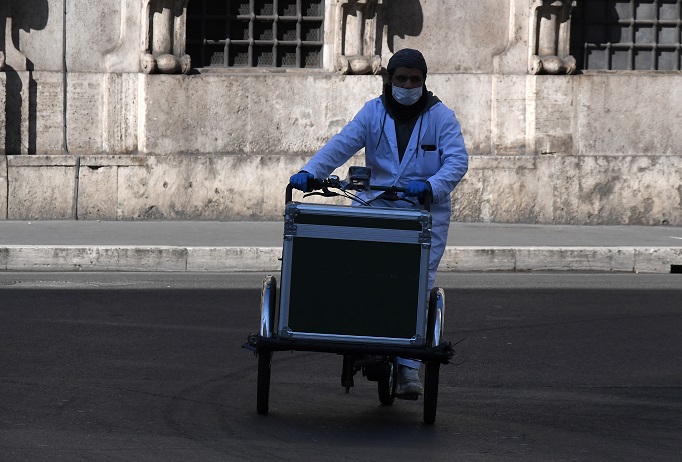Spike in death toll in Europe calls for stricter anti-virus measures
Published : 21 Mar 2020, 02:48
The novel coronavirus is showing no sign of abating in Europe, as the continent reported a significant increase of new deaths on Friday, with Italy seeing the biggest day-to-day spike in fatalities.
Also, more people across Europe tested positive for the coronavirus on Friday. The combined number of cases among European countries is approaching 130,000, accounting for almost half of the world's tally.
The fast spreading of the virus called for a stricter implementation of anti-virus measures and more drastic steps by European nations.
SPIKE IN DEATH TOLL
In Italy, 627 patients died of COVID-19 in a 24-hour span on Friday, the highest single-day deaths, bringing the country's COVID-19 death toll to 4,032, according to official data. In the previous 24-hour span, 427 people had died in Italy.
In addition, 2,655 patients were in intensive care, a small increase from 2,498 in the same category a day earlier, according to new data released on Friday by the Italian Civil Protection Department.
The cumulative number of infection cases reached 47,021 in Italy, since the epidemic first broke out in its north on Feb. 21.
Spain also recorded a steep rise in both death toll and infections on Friday. According to the Health Ministry, 1,002 people have succumbed to the COVID-19 disease by midday Friday, an increase of 235 deaths from a day ago.
The number of confirmed cases in Spain is approaching the 20,000 mark, with 19,980 cases confirmed by midday Friday -- an increase of 2,833 cases from Thursday.
Across Europe, the combined death toll from the coronavirus stood at around 6,000 by Friday evening. In France, 450 COVID-19 patients had died so far and total infections rose to 12,612. The virus had also claimed 177 lives in Britain and 106 in The Netherlands.
STRICTER IMPLEMENTATION
Italy announced on Friday that it would call up the military to help enforce the national coronavirus lockdown in the hardest-hit parts of the country.
There have been widespread reports in the national media that the terms of the lockdown -- which prohibit people from leaving their houses unless it is for "essential" reasons, such as medical visits, trips to grocery store or pharmacy -- have not been respected strictly enough, especially in worst-hit northern Italy.
On Friday, regional government officials announced that the military would be mobilized to help enforce the lockdown rules. At first, soldiers will only be deployed in Lombardy, the hard-hit region that includes Italy's economic capital of Milan. But the mobilization could be extended, officials said.
Also on Friday, the Spanish government introduced strict controls on roads leading out of the country's main cities in order to keep people at home during the lockdown.
According to the government, the Civil Guard will carry out control checks over the weekend to prevent people from traveling to their second homes in the countryside or at the beach.
In London, British Prime Minister Boris Johnson said that cafes, bars, pubs and restaurants must close from Friday night across Britain in a bid to contain the spread of the virus.
Night clubs, theatres, gyms, cinemas and leisure centers must also close on the same timescale, said Johnson during his daily briefing in Downing Street.
Bavaria, the largest state in southern Germany, has decided to impose a limited curfew and further restrictions to public life in order to slow down the spread of the coronavirus, Minister President of Bavaria Markus Soeder, announced on Friday.
"We are shutting down public life in Bavaria almost completely," said Soeder. Starting on Saturday, the population of Bavaria would be required to stay at home and only go out in exceptional cases during the next 14 days.
WUHAN OFFERS HOPE
In the Swiss city of Geneva, the World Health Organization (WHO) chief said Friday that Wuhan, the epicenter of COVID-19 outbreak in China, provides hope for the rest of the world that even the most severe situation of COVID-19 can be turned around.
Calling it a "success", WHO Director-General Tedros Adhanom Ghebreyesus noted that Wuhan, capital of central China's Hubei Province, reported no new cases for the first time since the epidemic outbreak started.
According to the Health Commission of Hubei Province, no new infections or suspected cases were reported on Thursday in Wuhan, marking two days in a row of zero report in the city in the months-long battle with the virus.
"The experience of cities and countries that have pushed back this virus give hope and courage to the rest of the world," Tedros said at a daily briefing.
Michael Ryan, executive director of the WHO health emergencies program, said it's a message of hope from China that the coronavirus can be suppressed, whose transmission chains can be broken through huge all-society effort, coordination, solidarity, commitment and workable supply chains, as well as engagement of activated communities and brave health workers.
"That is a message of hope to many other countries around the world who have very low number of cases right now," said Ryan.
Tedros said COVID-19 seems to reach a new and tragic milestone every day, as more than 210,000 cases, including over 9,000 deaths, have been reported globally.
"Every loss of life is a tragedy," Tedros said, calling it "motivation" to double down and do everything people can to stop transmission of the virus and save lives.


